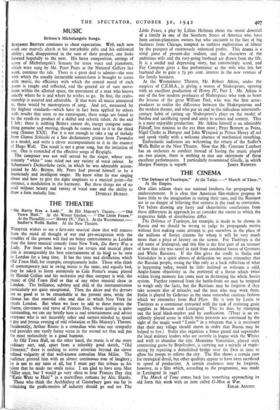THE THEATRE
" Du Barry Was a Lady." At His Majesty's Theatre. 6. Old
Town Hall." At the Winter Garden.--" The Little Foxes." At the Piccadilly.—" Henry IV," Part I. At the Westminster.— Sadler's Wells Ballet. At the New Theatre.
WILOEVER wishes to see a first-rate musical show that will remove from the mind all thought of war and pre-occupation with the troubles of the present will find no better entertainment in London than the latest musical comedy from New York, Du Barry Was a Lady. For those who have a taste for revues and musical plays this is incomparably the best entertainment of its kill to be seen in London for a long time. It has the taste and distinction which Old Town Hall, for example, conspicuously lacks. Those who think all contemporary jazz or swing music is the same, and equally bad, may be asked to listen attentively to Cole Porter's music played by Harold Collins and his orchestra and then compare it with the music of Old Town Hall or that of any other musical show in London. The brilliance, subtlety and skill of the instrumentation particularly are quite exceptional. Then the decor and the dresses are so good as to be remarkable at the present time, while the chorus has that essential chic and élan in which New York far excels London. But when we have to add to these merits the charm, cleverness and verve of Frances Day, whose quality is quite outstanding, we can say briefly here is real entertainment and advise everyone who is not incurably sober and earnest-minded to spend a gay and joyous evening of real relaxation at His Majesty's Theatre. Incidentally, Arthur Riscoe is a comedian who wins our sympathy and provides one vastly funny scene in the second act that will put the most melancholy in a good humour.
At Old Town Hall, on the other hand, the music is of the more ordinary sort, and, apart from a tolerably good sketch, "Old Ebenezer," there is nothing to arrest attention beyond the clever refined vulgarity of that well-known comedian Max Miller. The audience greeted him with an almost continuous roar of laughter_; he is not to my taste at all, but I must pay this tribute to his talent that he made me smile twice. I am glad to have seen Max Miller once, but I would go very often to hear Frances Day sing "Katie Went to Haiti" in a marvellous coltume by Alec Shanks.
Those who think the Archbishop of Canterbury goes too far in criticising the profit-motive irf industry should go and see The Little Foxes, a play by Lillian Hellman about the moral downfall of a family in one of the Southern States of America who have been cotton-plantation owners but who succumb to the lure of big business from Chicago, tempted to ruthless exploitation of labour by the prospect of enormously enhanced profits. This drama is a vivid piece of present-day realism, and the characters of the ambitious wife and the easy-going husband are drawn from the life. It is a sordid and depressing story, but convincingly acted, and Fay Compton gives a fine performance as the wife who lets her husband die to gain a 75 per cent. interest in the new venture of the family business.
At the Westminster Theatre, Mr. Robert Atkins, under the auspices of C.E.M.A., is giving a season of Shakespeare, opening with an excellent production of Henry IV, Part I. Mr. Atkins is one of the few modern producers of Shakespeare who took to heart the lessons of the great William Poe!, ho was the first actor- producer to realise the difference between the Shakespearean and the modern theatre, and who put an end to the ridiculous nineteenth- century habit of cutting up Shakespeare's plays on the model of
Sardou and sacrificing speed and unity to scenes and scenery. This is a most enjoyable production. Mr. Atkins himself is an admirable
Falstaff, less noxious to the eye than most ; Peter Bennett as Poing,
Nigel Clarke as Hotspur and John Wynyard as Prince Henry all act and speak vitally with a welcome absence of mechanical mouthing. Enthusiastic audiences are welcoming the return of the Sadler's Wells Ballet at the New Theatre. Now that Mr. Constant Lambert
has an orchestra to conduct instead of having the music played on. two pianos, there is nothing to mar our enjoyment of these excellent performances. I particularly recommend Giselle, in which


























 Previous page
Previous page